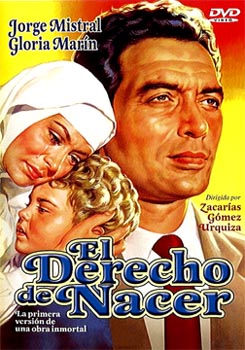
El derecho de nacer is a 1952 Mexican film directed by Zacarías Gómez Urquiza and starring Gloria Marín, Jorge Mistral and Martha Roth. based on a Cuban radionovela (radioplay) of the same name by Félix B. Caignet. The movie broke box office records in Mexico when it was first released; during its release in Mexico City in June 1952, it was shown at the downtown Cine Orfeón for seven straight weeks.
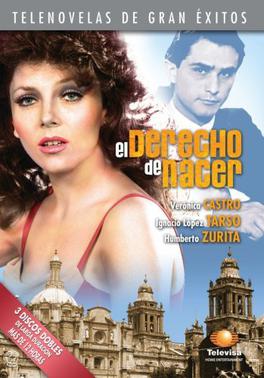
El derecho de nacer is a Mexican telenovela produced by Ernesto Alonso for Televisa in 1981. Based on the Cuban radionovela of the same name written by Félix B. Caignet adapted for TV by Fernanda Villeli and directed by Raúl Araiza.
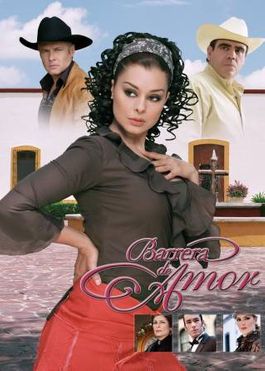
Barrera de amor is a Mexican telenovela produced by Ernesto Alonso for Televisa in 2005.
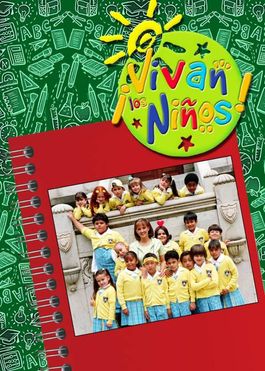
¡Vivan los niños! is a Mexican telenovela produced by Nicandro Díaz González for Televisa. It aired on Canal de las Estrellas from July 15, 2002, to March 17, 2003. It's an adaptation of the 1983 Argentinean telenovela Señorita maestra.
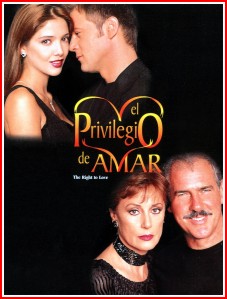
El privilegio de amar is a Mexican telenovela produced by Carla Estrada for Televisa. It aired on Canal de las Estrellas from July 27, 1998 to February 26, 1999. El privilegio de amar is a remake of the 1985 Venezuelan telenovela Cristal. El privilegio de amar is the highest-rated television program in Mexico to date; it registered an average of 34.8 percent of TV audience. The telenovela received the TVyNovelas Award for Best Telenovela in 1999.

Amar sin Límites is a Mexican telenovela produced by Angelli Nesma Medina for Televisa in 2006. This limited-run serial is a remake of the hit 2003 Argentine telenovela Resistiré; it is the first such remake, as a second adaptation, Watch Over Me, was created for MyNetworkTV in the United States and debuted in December 2006.
The XLVI Award of the Premio Ariel (2004) of the Academia Mexicana de Artes y Ciencias Cinematográficas took place on March 30, 2004 at the Palacio de Bellas Artes. The Premio Ariel for the best movie was awarded to El misterio del Trinidad.

Hasta que el dinero nos separe is a Mexican telenovela premiered on Canal de las Estrellas on June 29, 2009, and concluded on May 16, 2010. The series is created and produced for Televisa by Emilio Larrosa, based on the Colombian telenovela Hasta que la plata nos separe written by Fernando Gaitán. It stars Pedro Fernández and Itatí Cantoral as the titular characters.

Mujeres engañadas is a Mexican telenovela produced by Emilio Larrosa for Televisa in 1999-2000. The telenovela tells the story of four couples who live in the same apartment building.
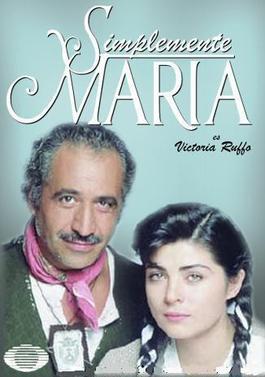
Simplemente María is a Mexican telenovela produced by Valentín Pimstein for Televisa in 1989.

Vivo Por Elena is a Mexican telenovela produced by Juan Osorio for Televisa in 1998. The telenovela has been repeated several times on different channels since its original airing.

Tres mujeres is a Mexican telenovela produced by Roberto Hernández Vázquez for Televisa in 1999-2000. When it came out it was such a success that they added 3x the normal amount of chapters. There are 280 Chapters when there are normally about 100 chapters. The Telenovela ended in 2000, which made it the longest Telenovela produced by Televisa until Clase 406.

Agujetas de color de rosa is a Mexican telenovela produced by Luis de Llano Macedo for Televisa in 1994.
El carruaje is a Mexican telenovela produced by Miguel Alemán Velasco for Televisa in 1972.
El niño que vino del mar is a Mexican telenovela produced by Mapat L. de Zatarain for Televisa in 1999. Starring by Imanol Landeta, Natalia Esperón and Enrique Ibáñez.
Tenías que ser tú is a Mexican telenovela produced by Carlos Téllez for Televisa in 1993.
La sombra del otro is a Mexican telenovela produced by Julissa and Giselle González Salgado for Televisa. It premiered on Canal de las Estrellas on May 27, 1996 and ended on Friday, August 16, 1996.
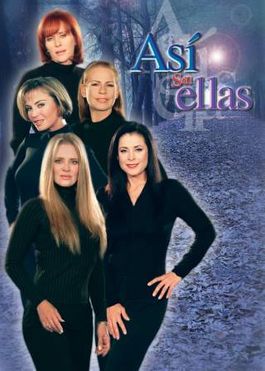
Así son ellas is a Mexican telenovela produced by Raúl Araiza for Televisa in 2002.

Vikki RPM is an American telenovela produced by Somos Productions for Nickelodeon Latin America. The series was presented in Natpe as Fórmula A. It is an original idea by Eduardo Jiménez-Pons, written by Catharina Ledeboer and Rocio Lara. It premiered on July 31, 2017, and it stars Samantha Siqueros, Stefano Ollivier, Isabella Castillo, Scarlet Gruber and Leo Deluglio. The series revolves around Victoria a young girl with a dream of becoming a great pilot of Formula 1.













